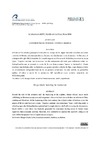Identificador persistente para citar o vincular este elemento:
https://accedacris.ulpgc.es/jspui/handle/10553/70488
| Campo DC | Valor | idioma |
|---|---|---|
| dc.contributor.author | Viú, Julieta | en_US |
| dc.date.accessioned | 2020-02-22T09:09:04Z | - |
| dc.date.available | 2020-02-22T09:09:04Z | - |
| dc.date.issued | 2015 | en_US |
| dc.identifier.issn | 2386-8635 | en_US |
| dc.identifier.uri | https://accedacris.ulpgc.es/handle/10553/70488 | - |
| dc.description.abstract | A finales de los setenta y principios de los ochenta, Mar go Glantz (1930) comienza a escribir, en diarios y revistas de México, crónicas que abordan la moda en relación con el cine, la pintura y la literatura. A principios del siglo XXI, la temática de la moda ingresa en el terreno de la ficción y se convierte e n un tópico. Zapatos: andante con variaciones resulta sumamente elocuente para reflexionar sobre esa ficcionalización que se concreta a través de lo que denominamos narrar la fascinación ””. Glantz construye una historia sobre las fantasías que genera acc eder a objetos de lujo y que alcanza a todos los consumidores independientemente de su posición económica. En este sentido, es productivo analizar el relato a partir de la perspectiva del capitalismo como religión, propuesta por Walter Ben jamin. | en_US |
| dc.description.abstract | Toward the end of the seventies and the beginning of the eighties, Margo Glantz (1930) starts publishing, in Mexican news papers and magazines, chronicles that discuss fashion in relation to films, painting and literature . At the beginning of the 21st century, the subject matter of fashion enters the sphere of fiction and becomes a topic. Zapatos: andante con variaciones le nds itself eloquently to reflecting upon the fictionalization materialized through what we shall call narrating the fascination . Glantz builds a story about the fantasies generated by consumers having access to luxury items regardless their economic positi on. Therefore it is productive to analyze this narrative taking as our basis Walter Benjamin’s view of capitalism as a religion. | en_US |
| dc.language | spa | en_US |
| dc.relation.ispartof | Philologica canariensia | en_US |
| dc.source | Philologica canariensia [ISSN 2386-8635], n. 21, p. 133-149 | en_US |
| dc.subject | 550510 Filología | en_US |
| dc.subject | 570107 Lengua y literatura | en_US |
| dc.subject.other | Margo Glantz | en_US |
| dc.subject.other | Narrativa latinoamericana | en_US |
| dc.subject.other | Moda | en_US |
| dc.subject.other | Capitalismo | en_US |
| dc.subject.other | Latin American narrative | en_US |
| dc.subject.other | Fashion | en_US |
| dc.subject.other | Capitalism | en_US |
| dc.title | Margo Glantz, narrar la fascinación | en_US |
| dc.type | info:eu-repo/semantics/article | en_US |
| dc.type | Article | en_US |
| dc.identifier.doi | 10.20420/PhilCan.2015.0037 | en_US |
| dc.investigacion | Artes y Humanidades | en_US |
| dc.type2 | Artículo | en_US |
| dc.identifier.ulpgc | Sí | es |
| dc.description.esci | ESCI | |
| dc.description.dialnetimpact | 0,0 | |
| dc.description.dialnetq | Q4 | |
| dc.description.erihplus | ERIH PLUS | |
| item.grantfulltext | open | - |
| item.fulltext | Con texto completo | - |
| Colección: | Artículos | |
Visitas
148
actualizado el 25-oct-2025
Descargas
119
actualizado el 25-oct-2025
Google ScholarTM
Verifica
Altmetric
Comparte
Exporta metadatos
Los elementos en ULPGC accedaCRIS están protegidos por derechos de autor con todos los derechos reservados, a menos que se indique lo contrario.
